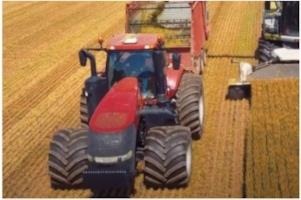By Sjoerd Willem Duiker
Soil compaction continues to be a threat this fall because of high soil moisture content. Field work is in high gear with corn silage being wrapped up, manure being spread, and corn and soybean harvest underway. Several years ago, we did a study in continuous no-till where the entire soil surface was compacted in spring during damp conditions with one pass of a loaded, 30-ton manure truck mounted with road tires inflated to 90-100 psi. Corn yield reductions were 27% in a dry year, and 14% and 10%, respectively, in years with more favorable moisture conditions (see Figure 1).

LSW tires on tractor are one way to increase the footprint and run low tire pressure while still carrying the load. This tractor was showcased at Penn State’s recent Field Crop Clinic in Landisville. Image Credit: Andy Jackson, Skyblu Farms